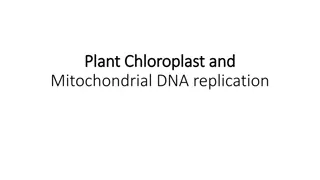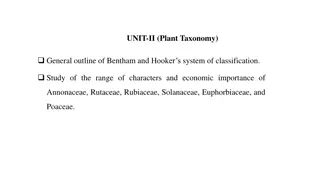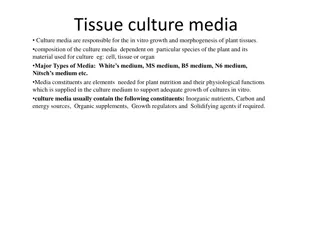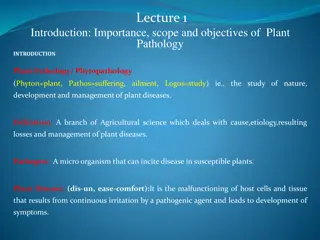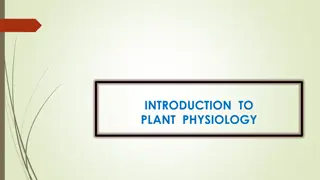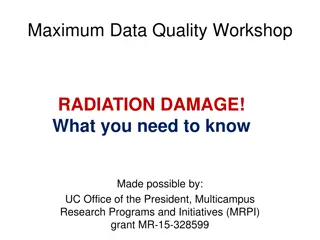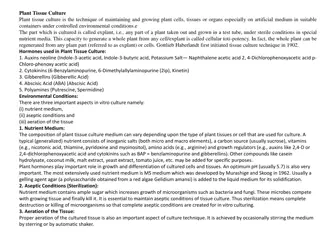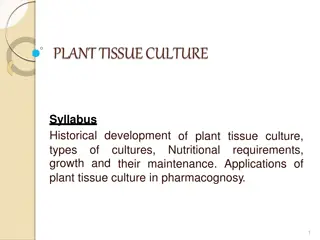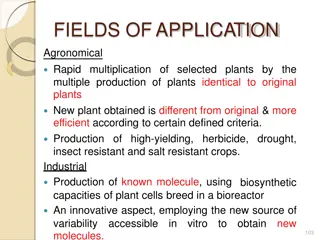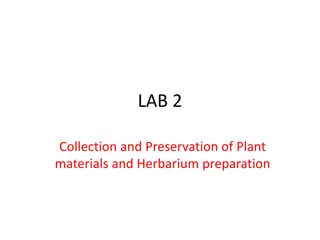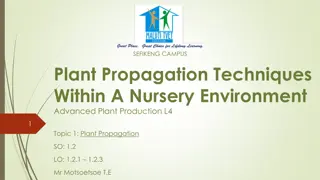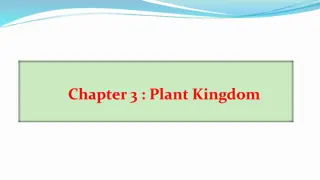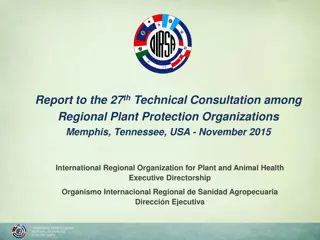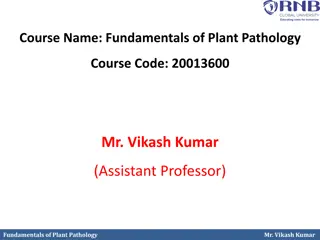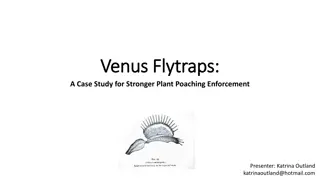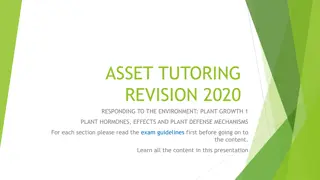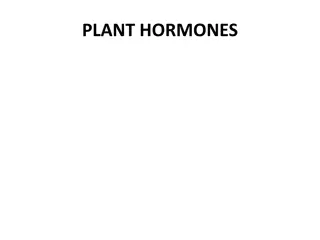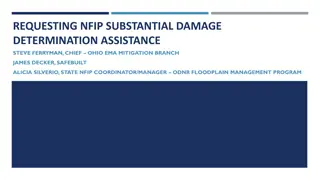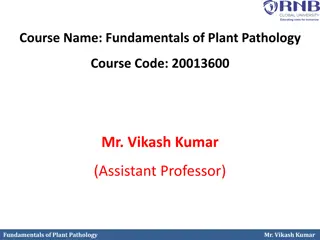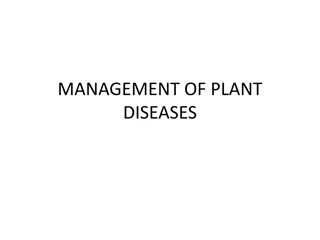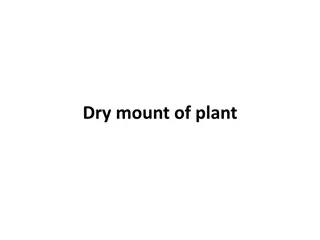Unit 1: Introduction and History of plant pathology
The science of plant pathology, which studies plant diseases and aims to protect the food supply by improving plant survival in unfavorable conditions. Explore the causes of plant diseases, their symptoms, and methods of prevention and control.
5 views • 13 slides
Amway Nutrilite All Plant Protein Powder 1kg Deutsche Post AG
Amway Nutrilite All Plant Protein Powder is a premium source of protein derived from plant-based ingredients. With each serving, you get a blend of high-quality protein to support your active lifestyle and dietary needs.\nAmway Nutrilite All Plant Protein Powder offers a convenient way to supplement
1 views • 4 slides
Challenges in Wind Damage Assessment Scales
The European Severe Storms Laboratory and the International Fujita Scale have been pivotal in evaluating wind damage from tornado events. However, issues such as vague damage descriptions, lack of scientific backing for wind-damage relationships, and applicability to different regions have posed cha
5 views • 25 slides
Plant Mitochondrial and Chloroplast DNA Replication Mechanisms
Plant mitochondria and chloroplasts have intricate DNA replication processes. Mitochondrial DNA replication is independent of the plant cell cycle and is associated with specific proteins in nucleoid complexes. Plant mtDNA contains more genes than animal mtDNA, with a complex structure involving int
1 views • 16 slides
Overview of Bentham and Hooker's Classification System in Plant Taxonomy
Bentham and Hooker's system of classification in plant taxonomy, outlined in Genera Plantarum, provided detailed descriptions of families and genera based on original plant dissections. This classification system has practical value for plant identification, with keys for taxa and subdivisions for l
4 views • 47 slides
Plant Tissue Culture Media and Their Importance in In Vitro Growth
Plant tissue culture media play a crucial role in the in vitro growth and morphogenesis of plant tissues. The composition of culture media depends on the specific plant species and the type of material used for culture. Various types of media, such as White's medium, MS medium, B5 medium, N6 medium,
1 views • 6 slides
Lightning Damage Prevention
Lightning strikes cannot be stopped, but their damage can be mitigated by redirecting the energy. This presentation explores the four basic types of lightning damage - physical, secondary effect, electromagnetic effect, and damage by ground reference potential. Learn about the dangers of lightning s
0 views • 8 slides
Plant Pathology: Importance, Scope, and Objectives
Plant pathology, also known as phytopathology, is the study of plant diseases and their management. It covers the causes, symptoms, and impact of pathogenic organisms on plants. The field aims to understand the interactions between plants and pathogens, develop control methods, and reduce losses in
0 views • 6 slides
Introduction to Plant Physiology: Exploring the Functioning of Plants
Plant physiology is a crucial subdiscipline of botany that delves into the processes and functions operating within plants. This field closely examines areas like plant morphology, ecology, cell biology, and genetics, shedding light on vital processes such as photosynthesis, respiration, and more. T
1 views • 7 slides
European Standards for Plant Biostimulants Development
The European Committee for Standardization (CEN) plays a crucial role in developing European standards for plant biostimulants, focusing on improving plant nutrition processes independently of nutrient content. The CEN/TC.455 committee is responsible for creating standards supporting the EU Fertilis
2 views • 5 slides
Radiation Damage in Crystallography
Explore the impact of radiation damage on crystallography, focusing on dose proportional to photons per area rather than time or heat. Learn about MGy, radiation damage world records, crystal lifetime based on flux and dose, and self-calibrated damage limits. Discover insights from various studies a
0 views • 71 slides
Plant Tissue Culture: Techniques and Applications
Plant tissue culture involves maintaining and growing plant cells, tissues, or organs in artificial mediums under controlled conditions. It allows the regeneration of whole plants from small plant parts or cells. Hormones like auxins, cytokinins, and gibberellins are used in the process. Proper envi
3 views • 5 slides
Plant Tissue Culture: Historical Development, Techniques, and Applications
Plant tissue culture is an experimental technique that involves the in-vitro cultivation of plant cells to produce secondary metabolites, regenerate plants, and study organogenesis. This process allows for the maintenance of disease-free plant material, biosynthetic pathway tracing, and cell immobil
0 views • 21 slides
Plant Tissue Culture Methods for Growth and Reproduction Study
Plant tissue culture methods such as root tip culture, shoot-tip culture, leaf culture, flower culture, and anther and pollen culture allow for the study of growth, reproduction, and genetic variations in plants. These techniques involve culturing various plant parts under sterile conditions to inve
2 views • 20 slides
Plant Tissue Culture Applications in Agriculture and Biotechnology
Plant tissue culture technology is a versatile tool used in agronomy and biotechnology for rapid multiplication of selected plants, production of high-yielding, herbicide, drought, insect, and salt-resistant crops, as well as the generation of phytopharmaceuticals, secondary metabolites, and novel c
0 views • 17 slides
Plant Quarantine and Phytosanitary Measures
Plant quarantine involves efforts to prevent the entry, establishment, or spread of foreign pests through legal restrictions on plant and plant product movement. It is crucial for safeguarding plant health, food production, and ecosystems. Phytosanitary measures aim to ensure the health of plants by
0 views • 33 slides
Mineral Nutrition in Plants
Mineral nutrition in plants involves the acquisition of essential elements in the form of inorganic ions from soil, followed by their absorption and utilization in various plant processes. Around 60 different elements have been reported in plants, with 30 being essential for plant growth. These esse
0 views • 39 slides
Plant Collection and Preservation Techniques
Explore the process of collecting and preserving plant materials for herbarium preparation. Learn about the importance of plant documentation, including dry and wet preservation methods. Understand why plant collection is crucial for systematics studies and serving as a reference collection for name
0 views • 25 slides
Plant Propagation Techniques in Nursery Environment
Learn about plant propagation techniques within a nursery environment, including nursery operations, potting seedlings, plant protection, weed control, packing of nursery plants, and crafting tissues for plant growth. Explore the essential tasks involved in nurturing seedlings and trees before they
1 views • 17 slides
Plant Kingdom Diversity and Characteristics
Explore the intriguing world of the plant kingdom through topics like classification by notable scientists, gamete characteristics in Phaeophyceae, unique features of Bryophytes, and the significance of Bryophytes as the amphibians of the plant kingdom. Delve into the structures and functions of pla
0 views • 21 slides
Plant Health Initiatives at the 27th Technical Consultation Among Regional Plant Protection Organizations - Memphis, Tennessee
The 27th Technical Consultation in Memphis, Tennessee focused on plant health initiatives by the International Regional Organization for Plant and Animal Health. OIRSA emphasized four key technical areas: plant health, animal health, agricultural quarantine, and food safety. Projects included addres
0 views • 13 slides
Evolution of Plant Pathology: From Ancient Remedies to Modern Discoveries
Uncover the rich history of plant pathology, from ancient practices in Vraksha Ayurveda to modern breakthroughs by scientists like Anton de Bary and Alexander Fleming. Explore the development of mycology, key discoveries in disease management, and the impact of plant pathogens on historical events l
0 views • 16 slides
Tools and Procedures for Radiation Damage Modeling and Intercomparison of Experiments
Calculation and comparison of radiation damage under different irradiation conditions to assess the impact on materials. Various factors affecting damage dose are considered, including atomic displacement, PKAspectrum calculation, simulation of irradiation processes, and identification of impurities
0 views • 6 slides
Plant Poaching Enforcement: A Case Study for Stronger Protection Laws
Understanding the importance of enforcing plant protection laws to combat illegal plant trade, this case study delves into the basics of poaching, the Lacey Act, challenges, and practical solutions. It discusses the global impact of plant poaching due to poverty and organized crime, highlighting the
0 views • 21 slides
Plant Growth Hormones and Defense Mechanisms: Understanding Plant Responses to the Environment
Plant growth hormones and defense mechanisms play crucial roles in how plants respond to environmental stimuli such as water, sunlight, gravity, and more. From auxins promoting cell growth to gibberellins stimulating flowering, this presentation educates on the intricacies of plant hormones and thei
1 views • 13 slides
Plant Hormones and Their Role in Growth and Development
Plant hormones are vital compounds that regulate various processes in plant growth and development. They are mostly organic and can be gases. These hormones are produced in one part of the plant and transported to other parts where they induce physiological effects. The main phytohormones include Au
0 views • 125 slides
Thermal Shock Testing of Gel-Bonded Magnesia Refractories
Study conducted by Paul Bosomworth at Leeds University in 1986 aimed to reduce mechanical damage after thermal shock in magnesia refractories used in sliding gates. The research focused on using gel-binders and achieving optimum grain packing to enhance thermal stress damage resistance. The study al
1 views • 7 slides
MSI Offers Professional Water Damage Restoration Services
There are different categories of water that can cause different degrees of damage Work with MSI specialists today for professional water damage restoration . \/\/ \/services\/water-damage-restoration
0 views • 13 slides
NFIP Substantial Damage Determination Assistance and Post-Damage Community Responsibilities
Substantial Damage Assessment is crucial in determining if properties in flood hazard areas have sustained damage exceeding 50% of their market value, requiring compliance with local floodplain management regulations. Communities participating in the NFIP play a vital role in regulating development,
0 views • 22 slides
Fundamentals of Plant Pathology: Understanding Viruses in Plant Diseases
Delve into the world of plant pathology with Mr. Vikash Kumar, as you learn about the nature, structure, and transmission of viruses affecting plants. Explore the important characteristics of plant viruses, their unique properties, and how they interact within plant cells. Gain insights into viral d
0 views • 14 slides
Flooded Home_ Here’s Why You Need Water Damage Restoration Right Away
Need water damage restoration? Act fast to prevent mold, structural damage, and costly repairs. Learn why timely restoration is crucial and how to choose the right service provider.\n\nKnow more: \/\/ \/san-diego-water-damage-restoration\/
0 views • 8 slides
Overview of Plant Quarantine and Disease Management
Plant quarantine is a crucial practice that involves regulating the movement of plants and plant products to prevent the spread of pests and diseases. Originating with the first law in France in 1860, plant quarantine now encompasses various methods such as embargoes and inspections to safeguard pla
0 views • 11 slides
Best Professional Water Damage Restoration Services
There are different categories of water that can cause different degrees of damage Work with MSI specialists today for professional water damage restoration. \/\/ \/services\/water-damage-restoration
0 views • 16 slides
Water Damage Repair Eastvale | 24/7 Emergency Water Damage Services
Professional water damage repair in Eastvale. We offer 24\/7 emergency services to restore your property quickly. Call now for fast, reliable water damage restoration.\nknow more- \/\/ \/eastvale-water-damage
0 views • 5 slides
Expert Water Damage Repair in Poway | Fast & Reliable Service
Need water damage repair in Poway? Our expert team provides fast and reliable solutions for water damage restoration, ensuring your home is safe and dry. Contact us today for a free consultation!\nknow more- \/\/ \/poway-water-damage
0 views • 5 slides
Water Damage Restoration Service in San Diego - Expert Water Damage Repair & Cle
Looking for reliable water damage restoration service in San Diego? Our experts offer fast, efficient, and professional water damage repair and cleanup solutions. Get in touch today!\nknow more- \/\/ \/san-diego-water-damage-restoration
0 views • 6 slides
How to Spot Hidden Water Damage in Your Encinitas Property
Water damage may be a sneaky invader that causes insidious structural damage and health hazards. If it is identified early then it helps us to save money and time, and stress. Contact us now. \nFor more info - \n\/\/ \/encinitas-water-damage\/\n
0 views • 5 slides
Water Damage Restoration Company
There are different categories of water that can cause different degrees of damage Work with MSI specialists today for professional water damage restoration. \/\/ \/services\/water-damage-restoration\n#Water_Damage_Restoration_Philadelphia
0 views • 16 slides
Pipeline Safety and Damage Prevention Update
The U.S. Department of Transportation's Pipeline and Hazardous Materials Safety Administration (PHMSA) provides insights on excavation damage as a serious threat to public safety and pipeline integrity. With a focus on prevention, the update highlights a decrease in incidents caused by excavation da
0 views • 29 slides
Dry mount of plant
Preserved plant specimens provide vital insights into plant diversity and distribution. Learn the steps involved, from collecting plant materials to pressing and drying specimens. Equip yourself with the necessary tools like a field press, secateurs, GPS, and more for effective plant collection. Dis
0 views • 10 slides



